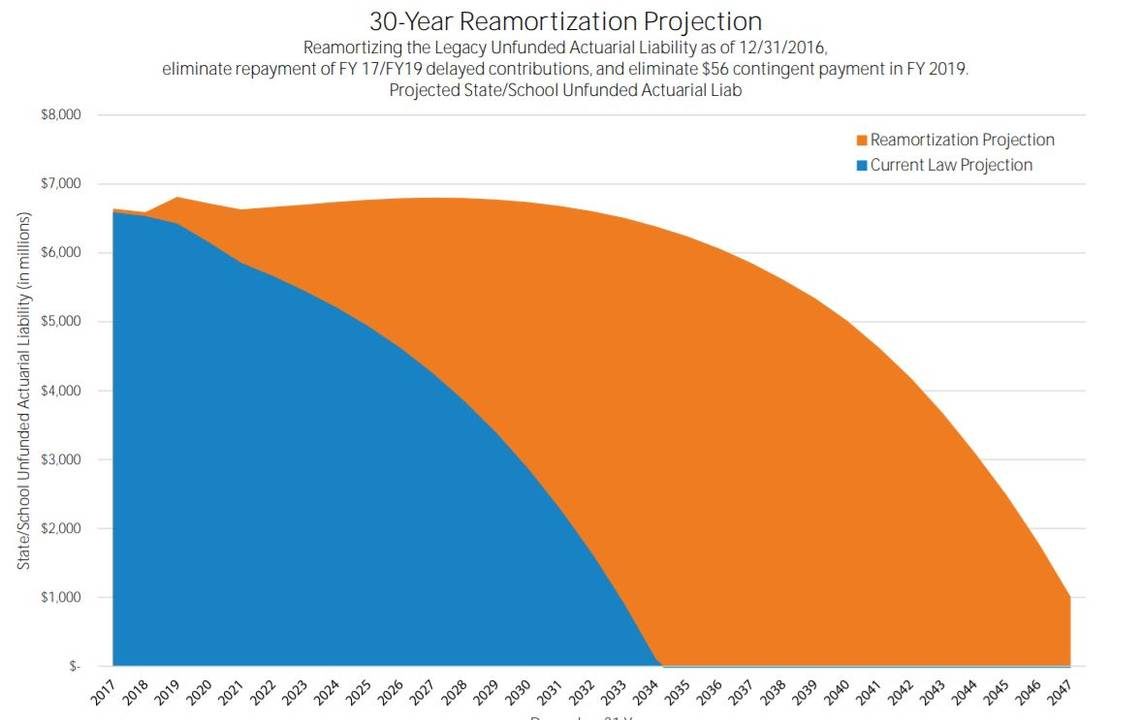Update: The House voted against the re-amortization plan Thursday afternoon by a vote of 87-36.
Members of the Kansas House will get their chance to debate the linch pin of Gov. Laura Kelly’s budget proposal–the re-amortization of KPERS. The House committee on financial institutions and pensions heard testimony on the plan that would push large, anticipated KPERS out over the next 30 years.
“This is an important issue. It’s the cornerstone to the Governor’s appropriations bill or budget, Rep. John Barker, an Abilene Republican, said. He moved to forward the legislation to the House without a recommendation for passage and without first working the bill in committee.
“Let the full body debate this issue,” he said. “I think we owe her that.”
When she announced her budget in January, Kelly faced swift opposition to re-amortizing KPERS. Chairman of the KPERS Board of Trustees, Kelly Arnold, issued a letter saying the board would prefer that the state continue making KPERS payments as previously planned. Currently, the pension system is 25 years into a 40-year plan to eliminate KPERS’ unfunded liability by 2035. Kelly’s proposal would push that back another 30 years.

“The board of Trustees believes KPERS is now at a crossroads,” Arnold’s letter reads. “…While 2035 is not tomorrow, it is within striking distance. Re-amortizing the unfunded liability for another 30 years pushes that finish line significantly into the future.”
Already other parts of Kelly’s budget proposal related to KPERS appear to be crumbling. The Senate recently agreed to make a $115 million payment to the state’s pension plan, over Kelly’s objections. And without re-amortization or a tax increase, enhanced spending in her $18.4 billion budget proposal for FY 2020— including Medicaid expansion, 2.5 percent pay increases for state workers, and $364 million more for public schools–may be doomed. Actual spending last year (FY 2018) was $15.9 billion.
Refinancing KPERS would net the state an additional $145 million in the short term, but cost an extra $7.4 billion long term. The higher interest payments were an issue of concern for Rep. Steven Johnson, an Assaria Republican, who testified before the House committee on Wednesday.
He said the interest on KPERS re-amortized future payments would cost the state daily what it costs to hire a new teacher.
“I do not want to use that credit card,” he said.
Larry Campbell, the state’s chief budget officer, was the lone proponent of the legislation, though Mark Tallman, Associate Director of the Kansas Association of School Boards, didn’t object to the proposal. He provided neutral testimony.
“Re-amortization is one of a number of choices the Legislature could consider in managing the SGF budget,” he said in written testimony to the committee. “Whether it is the right choice at this time is obviously something the Legislature will have to decide. But it seems likely that it will occur at some point.”
Kelly isn’t the first Kansas Governor to recommend pushing KPERS payments into the future. When then-Gov. Sam Brownback proposed pushing back planned KPERS payments for 10 years at a cost of $6.5 million, then-Sen. Kelly balked, saying Brownback was using “short-term thinking.”
“Everything is a patch to get him past this disaster,” she said at the time.



